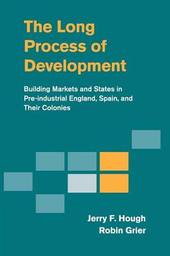
|
The Long Process of Development: Building Markets and States in Pre-industrial England, Spain and their Colonies
Paperback / softback
Main Details
| Title |
The Long Process of Development: Building Markets and States in Pre-industrial England, Spain and their Colonies
|
| Authors and Contributors |
By (author) Jerry F. Hough
|
|
By (author) Robin Grier
|
| Physical Properties |
| Format:Paperback / softback | | Pages:460 | | Dimensions(mm): Height 229,Width 152 |
|
| Category/Genre | Colonialism and imperialism
Economic theory and philosophy
Economic history |
|---|
| ISBN/Barcode |
9781107670419
|
| Classifications | Dewey:338.9 |
|---|
| Audience | | Professional & Vocational | | Tertiary Education (US: College) | |
|---|
| Illustrations |
4 Tables, unspecified; 2 Line drawings, unspecified
|
|
Publishing Details |
| Publisher |
Cambridge University Press
|
| Imprint |
Cambridge University Press
|
| Publication Date |
30 April 2015 |
| Publication Country |
United Kingdom
|
Description
Douglass North once emphasized that development takes centuries, but he did not have a theory of how and why change occurs. This groundbreaking book advances such a theory by examining in detail why England and Spain developed so slowly from 1000 to 1800. A colonial legacy must go back centuries before settlement, and this book points to key events in England and Spain in the 1260s to explain why Mexico lagged behind the United States economically in the twentieth century. Based on the integration of North's institutional approach with Mancur Olson's collective action theory, Max Weber's theory of value change, and North's focus on dominant coalitions based on rent and military in In the Shadow of Violence, this theory of change leads to exciting new historical interpretations, including the crucial role of the merchant-navy alliance in England and the key role of George Washington's control of the military in 1787.
Author Biography
Jerry F. Hough is the James B. Duke Professor of Political Science at Duke University. He has taught at Duke since 1973. He has previously taught at the University of Toronto and the University of Illinois, Urbana-Champaign, and he has served as a senior fellow at the Brookings Institution. Hough received his PhD from Harvard University in 1961. His research has focused on the Soviet Union, the democratization of Russia and America, and nation building in the United States. He is the author of How the Soviet Union Is Governed; Soviet Leadership in Transition; The Struggle for the Third World; Soviet Debate and American Options; Democratization and Revolution in the USSR, 1985-1991; The Logic of Economic Reform in Russia; and Changing Party Coalitions: The Mystery of the Red State-Blue State Alignment. Robin Grier earned her PhD from George Mason University in 1995. She was an Assistant Professor of Economics at Centro de Investigacion y Docencia Economicas (CIDE) in Mexico City before joining the University of Oklahoma in 1999. She became an Associate Professor of Economics in 2004 and a Professor in 2010. Grier's research has been published in the Journal of Development Economics, the Journal of Law and Economics, Economic Development and Cultural Change, Review of Development Economics, the Journal of Development Studies, Economic Inquiry, Public Choice, the Southern Economic Journal, Kyklos, Economia Mexicana, El Trimestre Economico, and Rationality and Society. Her area of specialization is the political economy of development in Latin America and Mexico.
Reviews'To better to understand today's developing world, Hough and Grier turn to history. Argument after argument, point after point, they demonstrate the benefits of doing so. This study adds to the legacy of North, Olson, Acemoglu and Robinson, all of whom have turned to the study of political history in an effort to comprehend the economics of development.' Robert Bates, Eaton Professor of the Science of Government, Harvard University 'How exactly does colonial history shape the subsequent economic development of a nation? The Long Process of Development is the best and deepest treatment of this question that has been penned.' Tyler Cowen, George Mason University 'Economists and policy makers have ignored the time it takes to foster substantial change in informal institutions that are a sine qua non for economic development and political stability. Synthesizing the classic works of Douglass North, Mancur Olson and Max Weber, Grier and Hough add a temporal factor that illuminates the slow pace to the modern world.' David D. Laitin, Watkins Professor of Political Science, Stanford University 'To my knowledge, this book is the first, and surely the first serious, attempt to confront the transactions costs-based approaches of Olson and North with the evolved-order approaches of Hayek and Buchanan. The result is a book of signal merit, explaining both the politics of economic development and the economics of political development.' Michael C. Munger, Duke University 'A development narrative that has both the historical long-view and the granularity of the particular. Their insights will be valuable to all students of development - and a healthy antidote to the fad panaceas of the day.' Lant Pritchett, Harvard University 'It may sound obvious and trite, yet it is the most underappreciated fact of comparative development: constructing effective states takes time - a very long time. As Jerry Hough and Robin Grier show, the process took more than four centuries in England and Spain. Their analytical history sheds light on why the norms and practices that sustain modern states require long periods of gestation to become solidly entrenched. This is a book with critical implications for today's state-building efforts in the developing world. It warns us not to expect miracles and teaches us that chance, contingency and time all play a larger role than we typically allow.' Dani Rodrik, Institute for Advanced Study, Princeton
|